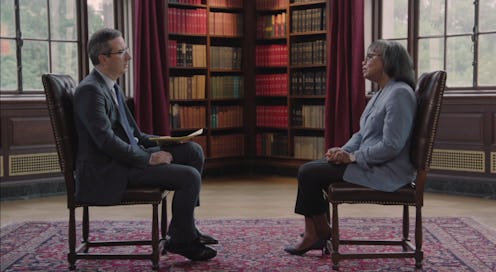News
John Oliver's Anita Hill Interview About Fighting Workplace Harassment Is A Must-See

On Sunday's episode of Last Week Tonight, host John Oliver interviewed Anita Hill about workplace sexual harassment, providing insight into the college professor's take on the "Me Too" movement, among other things. Hill famously accused now-Supreme Court justice Clarence Thomas of sexual harassment while he was going through the nomination process in the 1990s — and testified at his confirmation hearing for eight hours. Thomas has always denied engaging in misconduct toward Hill.
In 1991, Hill alleged Thomas had subjected her to unwanted sexual overtures when he was her boss years earlier at the Equal Employment Opportunity Commission. Hill's testimony in front of the Senate Judiciary Committee in 1991 brought workplace sexual harassment to national attention. However, it unfortunately also brought with it negative consequences for Hill, who was criticized by some for her testimony.
On his show, Oliver asked Hill about her famous testimony, inquiring what she thinks is different now vs. in 1991. Hill responded by indicating that she believes significant change has occurred for the better — and that workplace sexual harassment is taken much more seriously, especially following the "Me Too" movement. As Hill put it:
There has been a tremendous amount of change. There's been a chance in in public attitude and there's been a change in the information we have about sexual harassment ... There's simply more awareness after the "Me Too" movement. Even a few years ago, people were ambivalent about what the consequences should be concerning behaving incredibly badly in the workplace.
Later on in his interview with Hill, Oliver asked the college professor about more concrete actions that people can take to ensure that sexual harassment is diminished in the future. Hill responded by asserting that there are several important steps that can be taken to help end harassment.
First, Hill noted that workplace policies on sexual harassment need to be better publicized. She also indicated that workplaces need to ensure that people who experience harassment know exactly what to do in order to ensure that their workplaces take an active role in putting an end to the harassment. As Hill described, "[We need to] publicize the policies. And to inform people. This is what happens if you file the complaint. Here are the things that you will do. Here are the questions that you will face. Here is the process."
Hill also emphasized the importance of companies holding bystander trainings to help encourage others to stop sexual harassment if they observe it.
Oliver wrapped up his conversation with Hill by asking how hopeful she is that sexual harassment will be more readily diminished in the future. In response, Hill expressed cautious optimism, telling the late night host:
I'm clearly more optimistic than I was 27 years ago. But even then I was somewhat optimistic because I have seen people step up. I've heard from women whose lives have been changed because things happened differently when they went forward with their complaint than they would expected to have happened years before. So I am hopeful ... But, I will say, that if we do nothing, the change is not going to come.
Overall, Hill's thoughtful reflection on sexual harassment and the "Me Too" movement on Last Week Tonight offered words of both encouragement and caution. Hopefully companies, advocates, and the broader public will heed her advice when it comes to working to help end workplace sexual harassment.